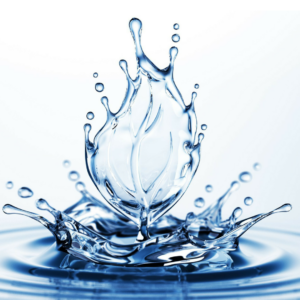03 Jun Hydrate or Die-drate
The human body is around 60% water, and our body fluids are maintained in a narrow range of +/- 0.2%. With the hot and humid summer weather upon us, it is so important to stay properly hydrated because even just 1% loss of body weight through water can impair our bodies’ performance. We lose water each day through both insensible and sensible water loss. Insensible water loss totals around 4 ½ cups of water each day and is the water we do not realize we are lose through breathing or through our skin (not sweat). Sensible water loss is the water we consciously lose through bathroom visits and sweating. This amount can vary greatly depending on your body composition and activity level. Athletes and those who are active (Zoom class anyone?) can lose anywhere between 1/2 to 9 cups of water through sweat daily! When we exercise, our body temperature increases triggering sweat production to cool us back down to normal. If you are in a state of hypohydration (under hydrated), your body has no fluid to sweat out and therefore no way to cool down. One of the easiest ways to check your hydration status is by looking at your urine color. (kind of gross, I know, but bear with me here) Light colored, transparent urine is optimal, and deep gold to brown is dangerous territory. (if your urine is brown you actually might need a doctor) Some other signs of dehydration include fatigue, dizziness, lightheadedness, and thirst. Know the signs and keep on top of any symptoms before they can intensify into something drinking water cannot help.
I know you’re wondering, “how can water be so important?” Well, your body uses water in what is called the Citric Acid Cycle to convert the energy stored in the foods that we eat into chemical energy in the form of ATP. This is the form of energy that keeps our body, (including our muscles!) functioning at all times. Water is a major component of our blood, acts as a shock absorber for our brain and spinal cord, and is crucial to many physiologic processes that utilize osmosis to transport nutrients and waste throughout our body. So yeah, it’s pretty dang important!
The recommendations for healthy adults are for men to consume 16 cups and women 12 cups of fluid each day. This absolutely can vary depending on body size, composition, and activity level. We do consume about 20% of that through the foods we eat, but the other 80% must come from drinking fluids. If you find it hard for you to remember to drink water, keep a reusable water bottle on-hand to sip throughout the day. For those who do not like the taste of plain water, jazz it up with some fresh fruit! Try an exciting combination such as strawberry and basil or blueberry and mint, or even watermelon and rosemary. Play around with different fruits because the possibilities are endless!
If you are looking to increase the amount of water you consume through foods, there are plenty of fruits and vegetables with high water contents. I’ve listed a few below to get your started. Just remember that grilling, roasting, or sautéing releases liquid from the produce (ie steam), so eat them raw for the biggest impact!
| · Grapefruit | · Watermelon | · Strawberries |
| · Peaches | · Lemons | · Cucumber |
| · Celery | · Lettuce | · Radishes |
| · Tomatoes | · Zucchini | · Pineapples |
As always, listen to your body. If you feel thirsty, take a drink! And next time you head to Zoom remember to hydrate or die-drate!
Written by: Katrina Fotovich, Zoom Instructor and University of Alabama Foods & Nutrition Graduate



